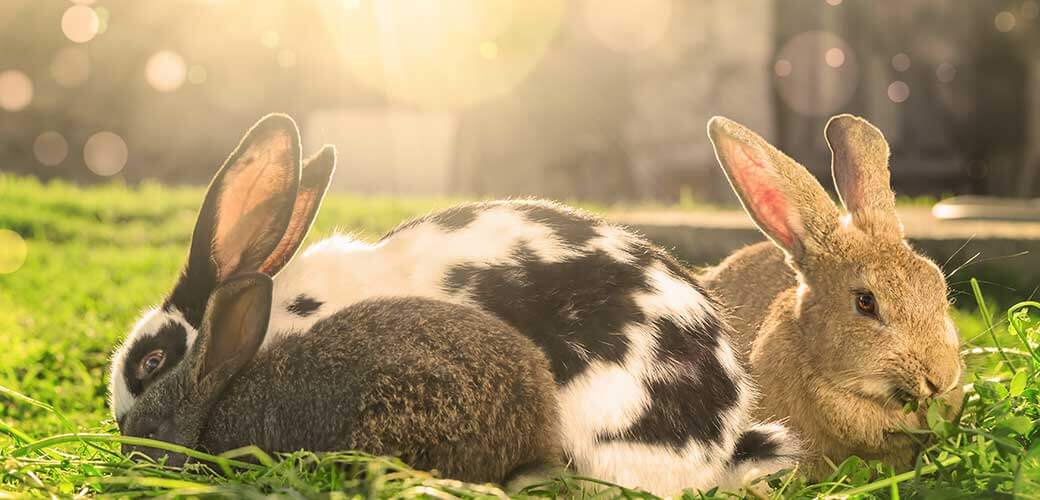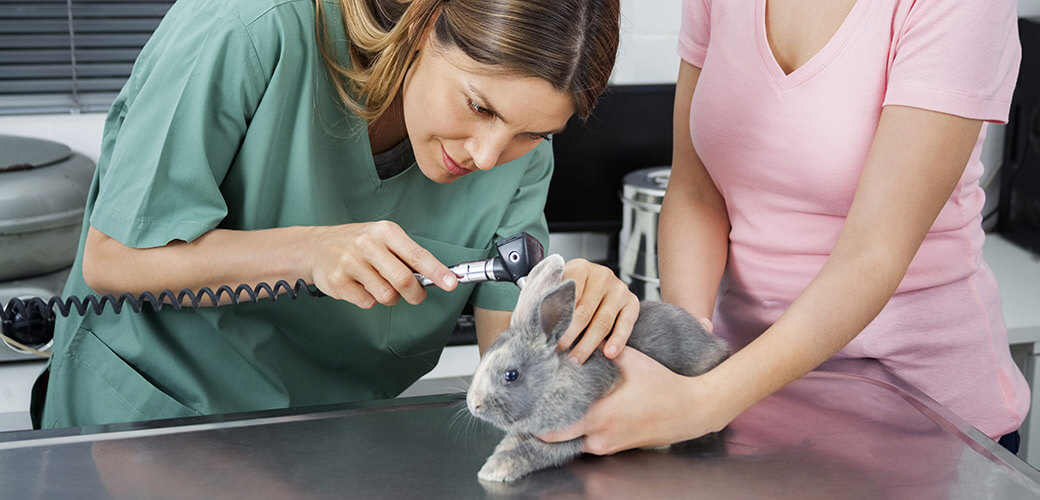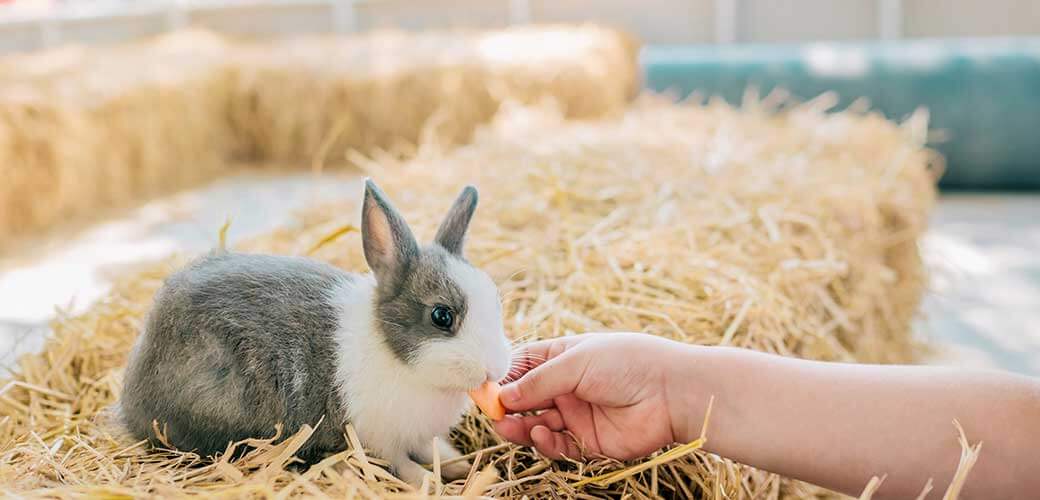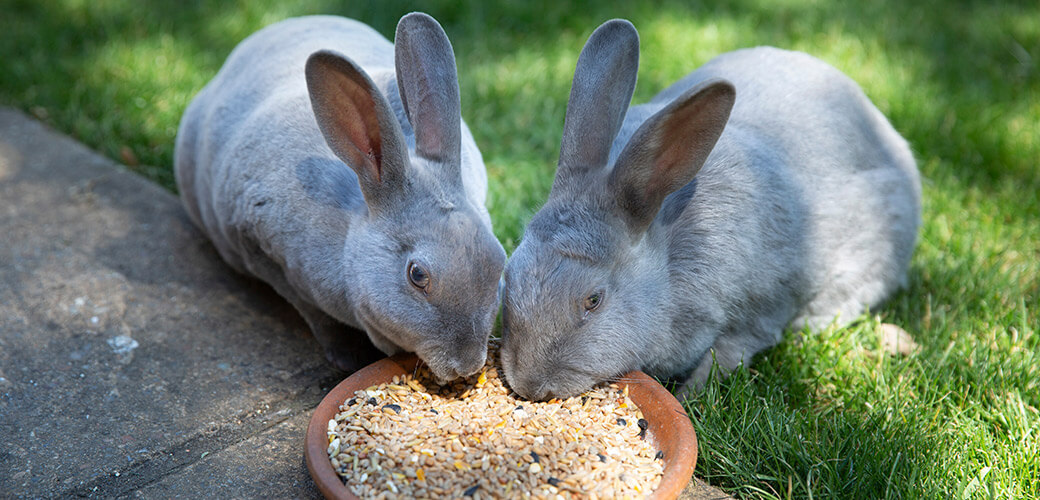When small mammals, such as rabbits or guinea pigs, suddenly have no interest in eating it can be a major cause for concern. Without getting the vital nutrients that their food provides, it’s only a matter of time before their health begins to deteriorate.
So if you’re wondering ‘Why is my bunny not eating?’ continue reading to find out everything you need to know including what steps you should take to resolve the problem.
Why Do Rabbits Stop Eating?
Rabbits can stop eating for a number of reasons. Primarily, it’s likely they will stop eating due to a medical issue. However, some rabbits may choose not to eat simply because they’ve grown bored of their usual diet. Take a look at the list below where we have detailed the most common reasons why a rabbit won’t eat.
A boring diet
In some cases, you could just have yourself a picky bunny. A rabbit’s diet should consist of 80% grass hay as it provides all of their essential nutrients so it’s understandable that some bunnies can get bored of eating hay day in and day out.
The treat trick
Take some of your rabbit’s favorite food and wave it in front of them. If they are quick to wolf it down, it’s highly likely that your rabbit isn’t eating because they’re not enjoying their regular diet.
Digestive upset
One of the most common reasons why a rabbit stops eating is because of a stomach issue. Sometimes, rabbits eat something that they shouldn’t which can result in a blockage. When this happens it can be difficult to treat and remove the issue and, in a lot of cases, the blockage will need to be surgically removed.
Gastrointestinal Stasis
Sadly, rabbits can also develop GI stasis which can be a life-threatening condition. Known as a silent killer, GI stasis causes the digestive tract to slow down and can even make it stop completely.
Gut stasis occurs if your rabbit doesn’t eat hay with an adequate amount of fiber. The bad bacteria will then start to accumulate within their intestines and will emit gas. As a result, your rabbit will feel intense pain causing them to stop eating properly which only exacerbates the problem.
As the gas taunts their system, their livers will begin to work more and more over time. Eventually, it will shut down completely.
Symptoms of GI stasis in rabbits:
- Loss of appetite
- Runny stools
- Visible bloating
- Lethargy
- Teeth grinding
- Passing little to no fecal pellets
- Lack of drinking
- Hunched posture
General pain
As with most animals, when a rabbit is in pain its appetite may dwindle. They may lose their appetite after having surgery or suffering an injury. In addition to this, the pain of arthritis can also lead to a poor appetite.
If you believe that general ailment is the culprit behind why your bunny stopped eating, see your vet. After examination, they may be able to provide some form of pain relief or, worst-case scenario, uncover another underlying cause behind the appetite loss. Whatever the reason, getting your bunny to a vet immediately will give you plenty of time to potentially solve the problem.
Dental disease
Dental problems are another common reason why your rabbit will stop eating. Rabbits’ teeth grow continuously and can grow to painful lengths if they don’t have access to foods and tools to help shave them down.
If left untreated, they can suffer extreme pain in their jaw and develop ulcers inside their mouths including on the tongue. When this happens, eating can be a difficult and excruciating thing.
Symptoms of dental problems:
- Poor appetite
- Drooling
- Sores/abscesses/ulcers inside the mouth
- Issues when grooming
- Weight loss
- Pawing at the mouth
Stress/anxiety
Not many people believe that pets can struggle with stress or anxiety but it’s actually quite common. Many things can cause a rabbit to become stressed including moving home, getting a new pet, changing their diet, changing their routine, and even parties and fireworks. So as you can see there are plenty of things that can affect your bunny’s mental well-being.
Generally, a lack of hunger as a result of stress will be temporary. However, in some instances, rabbits can even develop chronic stress which will have an effect on their desire to chow down regularly.
Symptoms of stress in bunnies:
- Lack of appetite
- Hiding
- Thumping
- Tense muscles and posture
- Ears flattened against the body
- Lack of nose twitching
- Overly reactive to sounds
- Running away from you or other pets
If your bunny has a history of behavioral problems it may show other signs of anxiety which may be perceived as aggressive. These signs include grunting/growling, boxing, and even baring their teeth at you.
Being overheated

Pet rabbits are very vulnerable to changes in temperature and are more likely to suffer from heatstroke compared to cats and dogs due to their small size. When your rabbit gets heatstroke this is an emergency situation and will require assistance immediately. If left untreated their organs can shut down leading to death.
Symptoms of heatstroke in rabbits:
- Appetite loss
- Drooling
- Lethargy
- Short/quick breaths
- Becoming unconscious
- Fits
Other reasons why your rabbit won’t eat
- Poor hygiene
- An insufficient diet
- Lack of furry companionship (for bunnies that live alone)
- A change in environment (Outdoors to indoors or visa versa)
Symptoms of Loss of Appetite in Rabbits
Since rabbits are a prey species they are talented at concealing symptoms of pain or vulnerability. This includes rabbits that are domesticated as this hiding instinct is still present in them. Because of this, it may be difficult to pick up on the subtle signs that they are not eating.
The first and most obvious red flag will be visible in their food bowls. If your rabbit isn’t eating you’ll notice that the volume of food in their enclosure will remain the same. In addition to this, you may notice a change in their activity levels. A rabbit that has stopped eating will become lethargic as they are not fueling themselves.
A rabbit that has stopped eating may also begin to show other signs such as drooling. When this happens you find the area around their mouth to be consistently damp. Also, if your rabbit is in pain, it’s possible that it may start to grind its teeth. This can have negative effects as they can damage their teeth and gums making it difficult to eat later on.
Weight loss is also a big symptom although if you act quick enough you may be able to prevent your bunny from dropping weight. By doing so, you can potentially prevent your rabbit’s health from deteriorating further.
Top tip:
Another huge indicator that your bunny has stopped eating will be their droppings. In most instances, your rabbit will be making small and/or fewer droppings. In others, they may have significantly soft stools or even diarrhea. Furthermore, their rear end will be unkempt/dirty and potentially damp.
Even if your rabbit’s health is in tip-top shape, make sure you keep a good eye on their food and water intake. The sooner you can spot a problem with their food or water intake the quicker you can work to solve the problem.
What to Do When Your Rabbit Stops Eating

There are a number of things you can do in an attempt to get your rabbit to start eating again. However, first and foremost you must always get a professional opinion. Consult a vet as soon as possible as it’s important to find what’s causing your bunny to stop eating.
Seek veterinary attention
When your rabbit turns its nose up at its food there’s a strong possibility that a health problem could be the culprit. Therefore, it’s important that you get immediate veterinary attention. A vet will be able to complete the necessary examinations to confirm whether the cause needs professional treatment or if it can be solved at home.
Diagnostic processes
After an initial examination is completed your vet may think it appropriate to complete further testing. This might involve subjecting them to X-rays, urine tests, fecal tests, blood tests, or further dental examination. It can be troubling to think of your bunny going through any of these tests but if your vet suspects a serious condition it’s important to get these done as soon as possible.
Treatments will likely include medications to encourage gut movement as well as something to relieve any pain. In severe cases, your bunny may have to be admitted to a veterinary hospital.
Home remedies

On some occasions, your vet may recommend some things for you to try at home. These may include the remedies listed below.
Assisted Feeding
A vet may be able to offer liquid food for you to feed your rabbit that involves using a syringe. If this is a recommended method, make sure you don’t force your rabbit into it as this can repel them further from eating.
When your rabbit is overheating
Firstly, if you think your rabbit is developing heat stroke, talk to your vet immediately. They will advise you to cool your bunny down gradually to reduce the chances of shock.
You can cool your rabbit down by moving them to a cool, shaded area out of the sun’s reach. If you have access to a fan, put them somewhere where the breeze can reach them. Additionally, use a cool, moist towel to dampen their fur and make sure they have access to clean, cool water. If none of these seem to do the trick, get back in touch with your vet.
Switch up their diet
Rabbits need a lot of fiber in their diets to ensure their digestive system is healthy and continues to work at top capacity. Timothy hay tends to be the type most commonly fed to rabbits but there are actually a few more choices you can take advantage of when encouraging your rabbit to eat (especially if your rabbit is fussy).
Using Timothy hay
Try using or adding a different cutting of Timothy hay. Typically, the hay you find will be the 2nd cutting so try using it alongside with 1st or 3rd cutting. These could also help to add some additional fiber to your rabbit’s diet.
Using Orchard hay
Orchard hay can also be added to your usual mix of hay to entice your bunny into eating more.
Using oat hay
This hay is a yellow-colored variation that can be a great substitute as it contains high fiber, protein, and fat. It’s also a delicious option for your rabbit and can entice the pickiest of eaters.
Evaluate and adjust their environment
If anxiety is the reason why your rabbit won’t eat, try to pinpoint the exact cause behind the distress. Listed below are a few things you can do to reduce anxiety:
- Move them to a quieter area
- Lower the volume of TVs or radios
- Spend time with your rabbit
- Use a treat to help calm them in stressful situations
- Keep an eye on the temperature and make sure it’s at a comfortable level
- Increase the size of their living space
- If they are the only rabbit, consider getting them a friend
Preventing a Loss of Appetite

Since a number of health problems occur from a rabbit’s lack of hunger, it’s important to look after them inside and out. Make sure their diet is of high quality and they get enough leafy greens. It’s also crucial that you take care of their teeth and make sure you don’t wait long periods of time between vet checkups. Furthermore, keeping their cage clean is vital as unhygienic living space can invite infections as well as anxiety.
If you’re considering a new food to introduce to your rabbit, take a look at our guide here.
Don’t forget that you can always talk to your vet about the best ways to care for your rabbit. If you’re in need of some tips or advice, make sure that you register with a vet that knows how to treat rabbits especially.

